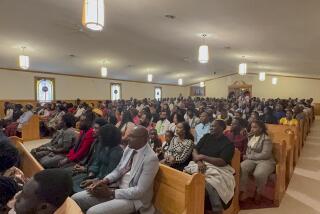Reason Sought for Disease Among Island’s People : Haitians in U.S. Battle Stigma of AIDS
- Share via
MIAMI — In Haiti, being branded a homosexual is like the kiss of death.
In America, being a Haitian is even worse.
“Just last week, a young teen-ager killed himself when his girlfriend and his friends found out he was Haitian,” said Dr. Roger Rousseau, a psychiatrist. “It was because of the stigma.”
The stigma: Haitians were designated one of four risk groups for contracting acquired immune deficiency syndrome--AIDS.
The 6 million Creole-speaking people who live in the Caribbean Island country of Haiti are the poorest in the Western Hemisphere. Unemployment exceeds 50% in the nation’s capital of Port-au-Prince and in the mountainous countryside, 85% of the population lives below the World Bank’s “absolute poverty level” of $135 a year. But being poor was something they could escape. Escaping AIDS has proved more difficult.
Haitians fleeing the regime of President Jean-Claude (Baby Doc) Duvalier arrived at the onset of a frightening new disease that was striking down young American men.
Found Disturbing Trend
Doctors soon found a disturbing trend. Enough AIDS cases were turning up in Haitians in the United States for the national Centers for Disease Control in Atlanta to designate Haitians a high-risk group along with homosexuals, intravenous drug users and hemophiliacs.
Haitian leaders were incensed. Never before had the Atlanta institution branded an entire nationality as a disease risk. But the stigma stuck, with AIDS hysteria peaking in Miami’s “Little Haiti,” where 25,000 Haitians are crammed into a few square blocks.
“Very soon, this place will be walled off like a ghetto, or we will be required to wear bells like the lepers,” Guy Durant, a member of the Haitian Coalition on AIDS, said in 1982 shortly after the action by the Centers for Disease Control.
Since then, scientists have been busy trying to find the key. But Haitian leaders in Miami says researchers have been hampered by their ignorance of Haitian voodoo blood practices and the fact that homosexuality is taboo in Haiti.
‘The Worst Word’
“Telling someone they are homosexual, it is like killing the whole family,” explained Dr. Jean-Claude Desgranges, who heads the Haitian Coalition on AIDS. “It is the worst word you can use in Haiti.”
Haitians with AIDS denied they were homosexual, making it difficult for doctors to determine the link.
Two years ago, Dr. Jeffrey Vieira of Brooklyn Hospital studied 10 Haitian refugees living in Brooklyn who had AIDS. He reported in the New England Journal of Medicine that voodoo practices--some involving “cutting each other with knives”--could explain the transmission of the disease.
Other Haitian leaders pointed to unsanitary health practices--such as using the same hypodermic needle for more than one injection--as another possible cause.
Next month, when the Centers for Disease Control hosts the International Conference on AIDS at the World Congress Center in Atlanta, Haitians will present data on their own studies.
Promiscuity the Key
The preliminary finding is that homosexual promiscuity is the main determining factor in who contracts AIDS.
“We found that when a person has AIDS his family does not. His friends are more likely to have it, but not the family. This indicates that sexual promiscuity is the important factor, not nationality,” said Desgranges, in discussing preliminary findings.
“This is a disease of big cities--like New York, San Francisco, Miami. It is a disease of a melting pot population. You don’t find it in small towns.
“The disease is related to life style, not nationality,” Desgranges said.
But until the findings are released and interpreted, Haitians will continue to be marked men.
John Narkunas, public health adviser with the Centers for Disease Control, said Haitians will be considered a risk group until statistics prove otherwise.
“We still don’t have any explanation as to why recent Haitian immigrants are having that large number of cases,” Narkunas said.
Stigma Is High
According to the Centers for Disease Control, 8,597 cases of AIDS were reported between 1979 and Feb. 25, 1985. Of those, 73% were homosexuals, 17% were intravenous drug users, 3% were Haitians and 1% were hemophiliacs.
The Haitian case numbers are low, but the stigma is high.
“When you keep telling people, ‘You have the disease, you have the disease,’ it is like brainwashing them,” said Desgranges.
Rousseau, a child and adult psychiatrist who also worked with the Haitian Coalition on AIDS, hopes the new studies will make life in America easier for Haitians.
“We are very positive and hopeful that these studies could change the image--the misconception--about Haitians and allow us to lead a normal life.
“We are trying to fight the prejudice,” Rousseau said. “Otherwise, the whole nation would be destroyed.”
More to Read
Sign up for Essential California
The most important California stories and recommendations in your inbox every morning.
You may occasionally receive promotional content from the Los Angeles Times.













